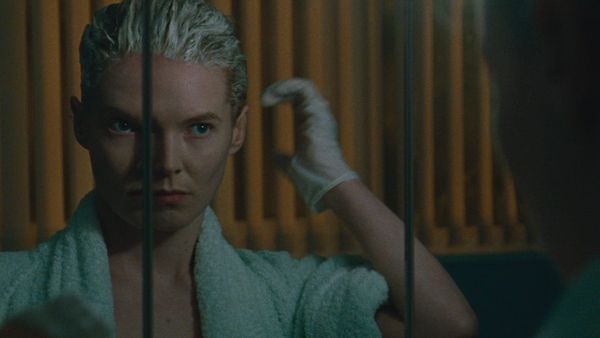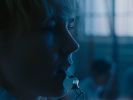Eye For Film >> Movies >> Blue Jean (2022) Film Review
Blue Jean
Reviewed by: Amber Wilkinson

When Jean (Rosy McEwen) explains the “fight or flight response” to the kids in her PE class she doesn’t mention that she knows the feeling all too well. It could describe her near-permanent state of anxiety as she struggles to balance her personal life with her lesbian girlfriend Viv (Kerrie Hayes) with her closeted professional one. That the year is 1988 and the news is full of Maggie Thatcher’s introduction of Section 28, which barred schools from "promoting the teaching of the acceptability of homosexuality as a pretended family relationship" only exacerbates the issue.
Blue is the dominant colour in the fabric of Georgia Oakley’s moving character study reflecting its melancholic mood. It also speaks to the chilling effect that government dictats like this can have on every aspect of life for those who they coerce to deny the truth of who they are, not to mention those who are impacted by extension.

The time period is expertly evoked, not just in the costuming of McEwen, who recalls Blue Jean-era Bowie, with her rolled sleeve macintosh bleached hair but in the beery, smoky atmosphere of the gay club she frequents. McEwen brings a quivering steeliness to Jean who is almost vibrating with stress as she moves from the warmth of the gay scene, where she is learning how much fun it is to be herself, to the gym class where every move is calibrated with aching precision. Even in her own home Jean seems conflicted and ill at ease, glancing warily at the neighbour washing her pots in the kitchen over the street and shooing Viv out when her sister drops her nephew off unexpectedly. She knows her sibling is a lesbian but displays a carefully cultured semi-denial, refusing to take down Jean’s wedding photo even though she’s divorced and suggesting that seeing her relationship with Viv might contaminate her son.
Jean’s maintenance of this intricate balance is stretched to the limit when a new girl Lois (Lucy Halliday) arrives at the school. A bullying rivalry that springs up between her and fellow 15-year-old Siobahn (Lydia Page) becomes even more treacherous to navigate for Jean after she spots Lois at her local gay bar. Everything about McEwen’s performance sings with stress, from the way she reacts to casual comments to the manner in which she lights increasing numbers of cigarettes. Her mental state is reflected in the jazz-inflected scoring from Chris Roe which underscores her moments of loneliness, while music from the era - perhaps inevitably including New Order's Blue Monday - offers a vibrant counterpoint. Viv, who is much more at home with her sexuality, feels the stress too in a relationship that burns with desire and sadness in equal measure. The intimacy of the camerawork from Victor Seguin helps to celebrate Jean’s moments of comparative freedom when out with her lesbian friends in comparison with the structured coolness of the school staffroom.
While Oakley occasionally lays the metaphors on a bit thick - Jean just happening to pick up Radclyffe Hall's The Well Of Loneliness a the perfect moment to spark a breakfast conversation and references to Alice In Wonderland’s not quite knowing who she is, for example - although at least the writer/director stops short of including Alice’s line: “But when you have to turn into a chrysalis—you will some day, you know—and then after that into a butterfly, I should think you'll feel it a little queer, won't you?". For the most part, the filmmaker makes her point more subtly to show how simply creating an atmosphere of denial feeds inequality and poor judgement even for those, like Jean, who ought to know better from her own lived experience. Talk of nurses wages and misogyny in the workplace that still finds echoes in the present also acts as a reminder that, no matter how far we might have come from 1988, there is still a long way on the road to equality that has to be travelled.
Reviewed on: 21 Dec 2022
















